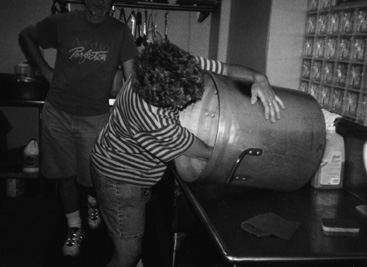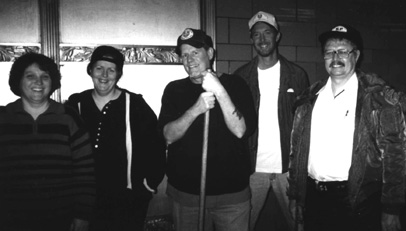 |
Working and Partying, VVAW-styleBy Barry RomoWe still had more meals to go. Seven hundred homeless vets were fed, as well as several hundred support staff. VVAW members were running the kitchen as usual, and it was 106 degrees outside with the heat index; the kitchen was even hotter. A homeless veteran looked into the kitchen, calling us to "ATTENTION!" He demanded to know why we were smiling while scrubbing pots and pans. His face softened, his voice softened, then he smiled and said, "I want you to know that I really appreciate what you're doing. Thanks." Twenty-one VVAW members from the National Office and the Chicago and Champaign-Urbana chapters assembled for the fifth year in a row to run the kitchen at this summer's Homeless Standdown. The VA workers who run these standdowns had already given us an award, taken us out to dinner, and said, "We could not do it without you." High praise indeed from some pretty selfless workers. They put in twice as much time as anyone feeding, clothing, and providing benefits and medical care to these folks who are part of the unseen social cost of U.S. warmaking.
Work and action have always defined VVAW, more than resolutions and petitions. VVAW participants at this year's Standdown were Vietnam vets, Grenada vets, Gulf War vets, and UN peacekeeping forces. This even included one young brother, John, who had just refused a commission in the Marines at Quantico. John had already been in the Corps for two years, when he graduated from the University of Illinois at Urbana-Champaign in May 1998. He had every intention of becoming a Marine officer after he obtained his college degree. But VVAW, in the persons of Bill Ehrhart, Joe Miller and myself, kind of got in the way. John was a student in Joe's course on the Vietnam war this past Spring. This gave him an opportunity to attend two weeks' worth of Bill Ehrhart events, as Bill was a Guest-in-Residence at the University during this period. Bill kept asking John why he thought he wanted to be an officer in the Corps. Who did he think he would be "defending"? John didn't stop coming to these events. He told Joe he felt he was testing himself. I asked John similar questions and provided similar challenges. For fifteen weeks in the Vietnam class, John read and listened and even spoke out about his plan to become a Marine officer upon graduation. We thought we had "lost" him. One week before the Standdown, Joe received a phone call from John. He had just returned from his final training at Quantico. He told Joe that during training everything Bill and I had said to him kept whirling through his head. John could not accept the commission. His original view of possibly remaining insulated from the dehumanizing aspects of military life was challenged by his training experiences. When Joe told him about the Standdown, John said, "I'll be there." And he was. (As a side note, it was interesting to watch these younger vets eyeing the "duck hunters." You know, those 50-year-old men in Persian Gulf fatigues with stomachs the size of Mount Rushmore, with buttons and pins covering their hats and bodies proclaiming themselves to be "tunnel rats," "commandos," "Special Forces Rangers," and so on. You get the picture.) It was truly gratifying to see that these young vets both confided in us and saw us as their brothers and sisters. VVAW was also joined by two carloads of students who drove up two and a half hours from Champaign-Urbana. They've been active in the movement to oppose the racist mascot at the University of Illinois, and have attended seminars and classes with VVAW. In addition, my 16-year-old daughter and two of her friends put in a solid ten-hour day, making six hundred box lunches, washing tons of fruit, and serving on the chow line. Toward the end of the final day, one of the big'uns from VVA came over to talk with me. A little under the weather (a half gallon of bloody marys will do that to you), and twice my size, he said, "We're not supposed to get along. That's what they tell me. I might not like your politics, but I love you guys." Then he nearly squeezed the life out of me with a huge bear hug. The following weekend, the July 4 campout in Central Illinois seemed like a continuation of the standdown in many ways. Here again, VVAW members, including two Gulf War vets, were joined by young social justice activists from the University of Illinois. Most of us didn't camp in tents, however. There's a large converted barn with hardwood floors, screens, fans, and a fridge. The campout, in fact, was more like a slumber party, since we stayed up all night, eating, drinking, singing, joking, talking politics, and finally sleeping in the barn. Working together and partying together. Helping our fellow vets of all eras, and having good politics. That's what makes VVAW different from the rest. That's why we have younger people joining. And that's why VVAW has to keep on truckin'.
|



